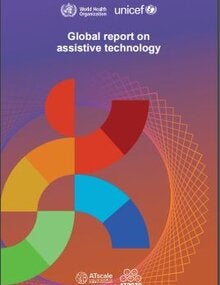Overview
Considering that a majority of the people who need assistive technology do not have access to it, and scarcity of data on need and access, on 26 May 2018 the World Health Organization (WHO) Member States adopted a resolution on Improving access to assistive technology (WHA71.8)(1). The resolution urged Member States to take a series of affirmative actions and requested the WHO Director-General to prepare a global report on effective access to assistive technology in the context of an integrated approach, based on the best available scientific evidence and international experience, with the participation of all relevant units within the Secretariat and in collaboration with all relevant stakeholders. It also requested WHO to report every four years until 2030 on progress towards implementing the resolution.
This report outlines measures adopted worldwide to improve access to assistive technology, thereby enabling, empowering and promoting the inclusion, participation and engagement of persons with disabilities, ageing populations, and people living with chronic conditions or temporary impairments. Special attention is given to the need of vulnerable populations, especially children with disabilities, people living with multiple or severe impairments, older people and people living in poverty.
The current report:
- presents a comprehensive dataset, description and analysis of current assistive technology access;
- draws the attention of governments, bilateral and multilateral organizations, private sectors and civil societies to the need for, and benefits of, assistive technology, including its related return on investment;
- makes recommendations for concrete actions that will improve access to assistive technology, especially in resource-limited settings, based on the best available scientific information and international experience; and
- supports implementation of the UN Convention on the Rights of Persons with Disabilities (2) and making universal health coverage (UHC) inclusive and achieving the Sustainable Development Goals (SDGs).
|

